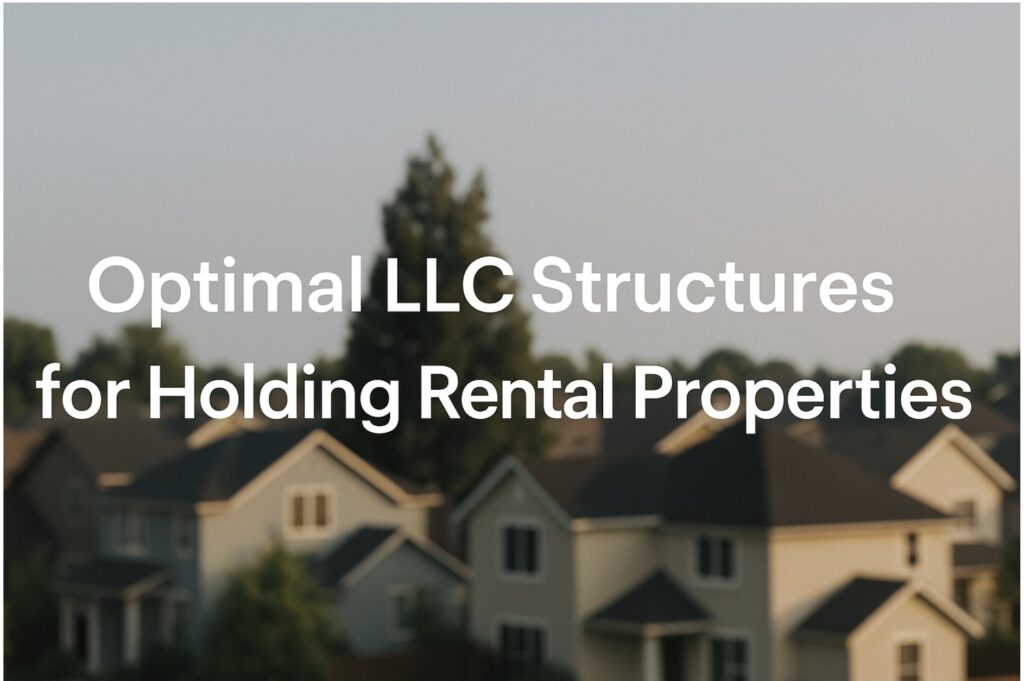
🏡 Why Real Estate Investors Should Use LLCs to Own Property
Real estate investors often turn to Limited Liability Companies (LLCs) as a smart, strategic way to hold rental properties. Yes, setting up and managing an LLC takes some time, money, and paperwork, but the legal protections and financial benefits they offer can make that investment worthwhile. Let’s break down why LLCs matter, how to structure them, and your options for getting started—whether you’re DIY-ing or hiring the pros.
⚖️ What’s an LLC—and Why Should You Use It for Real Estate?
An LLC (Limited Liability Company) is a legal business entity that blends liability protection with flexible taxation. For real estate investors, LLCs serve one main purpose: shielding your personal assets from property-related risks.
Say a tenant gets injured and files a lawsuit. If the property is held in your personal name, your home, savings, and future income could be vulnerable. But if it’s held in a properly managed LLC, any liability is generally limited to the LLC’s assets, so your personal wealth stays safe.
💡 Top Benefits of Holding Property in LLCs
✅ 1. Asset Protection
LLCs draw a legal line between your personal wealth and rental properties. In a lawsuit, only the assets inside the LLC (like the property itself and its business account) are exposed.
Want stronger protection? Use a layered structure—one LLC per property, all owned by an umbrella LLC. States like Wyoming offer “charging order” protections, meaning creditors can’t easily access funds or force asset sales.
✅ 2. Privacy & Anonymity
Don’t want your name popping up in public property records? LLCs make that possible. States such as Delaware and Wyoming allow you to list organizers or managers instead of revealing ownership. It’s not bulletproof, but it does make you harder to target.
✅ 3. Streamlined Estate Planning
Own multiple properties? Placing them under a single umbrella LLC can simplify inheritance. Instead of transferring each deed, you can pass along the LLC in a trust—saving time, money, and potential legal headaches.
✅ 4. Tax Flexibility
LLCs offer pass-through taxation, meaning profits and losses flow directly to your personal return—no corporate double taxation. You can also gift ownership shares to heirs gradually, potentially reducing estate taxes. For advanced strategies, books like Tax-Free Wealth and Start Your Own Corporation are great resources.
🔧 Ideal LLC Setup for Real Estate Investors
Many investors use this two-tier model:
- Property-Specific LLCs in the same state as each rental
- One Umbrella LLC in a privacy-friendly state (like Wyoming)
This limits liability property by property, deters lawsuits, and simplifies estate and tax planning.
⚠️ Why You Might Avoid Using Just One LLC
If all properties sit inside one LLC, a legal issue with one could threaten them all. Separating them helps isolate risk and improve protection.
🛡️ Why Use an Umbrella LLC?
Umbrella LLCs add anonymity, enhance protection, and simplify estate transfers. They’re especially handy for investors with multi-state portfolios.
🗺️ State-Specific Rules
Some states—like Florida—charge transfer taxes when moving property into an LLC. Florida also has strong homestead protections, so LLC ownership may not be ideal for your primary residence. Always consult with a local attorney or CPA.
🛠️ How to Set Up Real Estate LLCs
DIY Route
Totally doable with some research. Here’s what you’ll need:
- Choose a state and name
- File Articles of Organization
- Appoint a registered agent
- Create an Operating Agreement
- Open a separate business bank account
- Keep finances strictly separated
Outsourced Option
For multi-property or multi-state investors, hiring a firm can save time and reduce legal risk. Services may include:
- Unlimited LLC setups
- Registered agent services
- Ongoing compliance help
- Asset protection planning
🧠 Final Thoughts
Building a solid LLC structure is one of the smartest moves you can make in real estate. It protects your personal finances, guards your privacy, and simplifies future planning. Just treat it like a business—stay compliant, keep records, and lean on legal and tax experts for guidance.
⚠️ Disclaimer: This guide is educational and not legal or financial advice. Be sure to consult your own trusted professionals before making decisions.
Want help breaking this down into a checklist or turning it into a slide deck or blog post? Just say the word!
